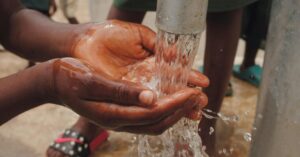Inclusive action for committed work to combat inequalities
(from the Budapest Water Summit)
Wednesday’s forums and plenaries reminded us more than ever of why we are actually meeting here in Budapest. Several of the events that I attended addressed the human rights aspect of water and sanitation, the implications of lack of access, and why there is such a pressing need to act. Awareness of inequalities and inclusiveness where key words in the discussions. Who do we mean when we talk about the poorest and most suffering communities, and how do we reach them? How do we make sure that they are included in the discussions? Sitting in the conference halls surrounded by easily accessible drinking water and toilets, the 1 billion people who are defecating in the open and the 1, 8 million children dying each year from water borne diseases are far too distant from the discussions. We need to make sure that the dialogue on Post 2015 process and the development of the SDGs are not made without listening to the voices of the poor and most vulnerable, and ensure that we spur inclusive action for committed work to combat inequalities when pushing for a dedicated goal on water.
In the High-level panel discussion: How to WASH, Catarina de Albuquerque, UN Special Rapporteur on the Human Right to Safe Drinking Water and Sanitation, raised her voice and shared her insights on how to address inequalities in the context of water and the importance of proper monitoring, to be able to progressively eliminate inequalities. She expressed that by shaping initiatives to local conditions, they will have a greater chance of success. De Albuquerque stated that we have to go beyond good intentions, avoiding making the same mistakes as before, as we have an obligation towards the poor and marginalised.
Target c of Millennium Development Goal 7 (MDG7c) focusses on access to safe drinking water and basic sanitation and is significantly lagging behind in terms of progress. In reality, this means that the global community is not doing enough to provide a safe, healthy and dignified life for millions of adults and children. SIWI’s 2013 Stockholm Statement advocates for a dedicated Sustainable Development Goal on Water because it is the poor and marginalised who are the most vulnerable to floods and droughts, to untreated wastewater and neglected water sources which offer poor quality water.
When discussing how to come together and push forward for water in sustainable global development, stakeholders representing governments, NGOs, the UN, etc., have different priority areas and thoughts on how to ensure that we strive for a water wise world. What is clear though is the importance of keeping focused on what we want to achieve, and why. Touching base with other actors in the water community is for this reason inspiring and indeed valuable, and help us to identify where we are in the processes and see where SIWI can best contribute and engage to place water high on the Post 2015 agenda.
Other discussions today centered on the necessity of directing anticipated impacts at the micro level while respecting specific socio-cultural contexts of small communities, and the possible failures coming from lack of fair partnerships and zero consultations at a local level. This made me remember an interesting seminar I attended during World Water Week; Strengthening Community Managed W&S in Latin America. The seminar focused on how to strengthen community managed WASH-organisations in order to increase and improve equality in access to WASH-services. I specially remember the input from Mercedes Tinoco, Universidad de las Regiones Autónomas de la Costa Caribe Nicaragüense, Nicaragua; Case Study from Indigenous Communities of the Nicaraguan Caribbean Coast. She gave concrete examples of how sanitation initiatives became more successful when the local communities were involved in management planning, as the projects could integrate both social dynamics and cultural context perspectives.







